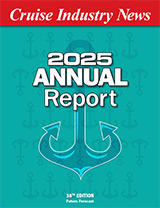Following the October 7th hijacking of the Achille Lauro, only Sun Lines, Sea Goddess Cruises Limited and Costa Cruises have altered their itineraries. The rest of the lines operating in the area reported that they are sailing as planned, even though some of their ships are scheduled to arrive in Alexandria within the next few days.
The Royal Viking Sky “just left Alexandria” and will return on October 11, according to a spokesman at Royal Viking Line. The line is in constant contact with the Egyptian port officials, and has been assured that extensive security measures will be taken when the ship arrives. It is also reported that Royal Viking’s president, Warren Titus was vacationing aboard the ship at the time of the hijacking, and he is now monitoring the situation from the area. However, the line “has reserved the right to alter its itinerary up to the last minute. According to reports, it has received plenty of phone calls but only three cancellations to date.
K-Lines’ Orion set sail from Piraeus for Port Said on October 8th, as it does every Tuesday, and will continue to do so, according to a spokesperson for the line. Similarly, representatives from Chandris, Cunard, Paquet and Epirotiki all reported that they were proceeding as scheduled. Princess Cruises could not be reached for comment.
Sun Lines has cancelled Stella Solaris’ call in Alexandria. As this is the ship’s last scheduled cruise to this area, no other itineraries have been affected.
Sea Goddess Cruises has dropped its calls to Alexandria, Port Said, and Haifa from its October 19 sailing, and substituted ports in Italy and the Greek Islands. Sea Goddess II’s October 30 sailing remains unchanged at this time, with calls at the Egyptian and Israeli ports. Sea Goddess is offering clients the option of changing from one cruise to the other, depending on their interest, and pending space availability.
As a precautionary measure, Costa Cruises has dropped Alexandria from the Danae’s Ocotber 5th sailing, although it has not cancelled a call in Israel. Costa also has reversed Danae’s later itineraries in the Mediterranean, to postpone her arrival in Egypt. According to Costa’s president Howard Fine, there have been no cancellations and two bookings reported since Monday.
This incident, as well as the recent TWA hijacking, has raised questions about the cruise industry’s security measures.
According to many industry officials, there are no security regulations regarding cruise ships and ports comparable to those imposed by the Federal Aviation Administration after several hijackings in the 1960’s. Nevertheless, the recent acts of terrorism have prompted several lines to focus on ways in which they can improve their efforts.
Since the TWA incident, Sun Lines stations an officer and two sailors at the gangway when a ship is in port, and no longer allows visitors aboard according to the line. Additional measures are currently being studied.
Security measures also have been beefed up at Royal Cruise Line, where one of the line’s captain’s recently completed a two-and-a-half-week investigation tour of the Mediterranean. The captain assessed the security of each port, including the number of access points to individual berths, police inspection of traffic, and the availability of armed personnel and tactic groups. Upon his recommendation, Royal Viking now places armed personnel on its gangways, and equips them with walkie-talkies.
At Sea Goddess, security has always been a top priority, according to Ron Kurtz, president of the line.
“In planning itineraries, Sea Goddess executives seek destinations where guests will enjoy themselves ashore without undue risk or concern, and places where the line can properly control access to the ship,” Kurtz said. Only passengers are allowed on board; and because of the limited number of passengers, the large staff and Sea Goddess pre-cruise procedures, the staff “literally knows each passenger, even before he comes aboard.”
Kurtz further explained that the Sea Goddess ships anchor more often than they dock, making it extremely difficult for people other than passengers to gain access to them.
Sea Goddess continually monitors and refines its security program, making sure it remains as effective as possible according to Kurtz.
At Costa, technological devices, such as metal detectors, are available, although they are not used regularly; and employees are schooled in security with the help of state and local officials. In addition, only passengers are permitted on board when a ship is in port.
Cunard adopted stringent security measures after it experienced a bomb threat in the early ’70s. The line no longer permits visitors aboard, and it has cancelled its bon voyage parties. In addition, it uses metal detectors to screen all passengers, crew members and luggage; and has security staffs aboard the ship.
Paquet reported that it was reevaluating its embarkation and passenger identification procedures, but could not elaborate for security reasons.
For most shipping lines, however, the extent of their security measures consist of limiting access to the ship by requiring that passengers have tickets and register their guests who come aboard, Ron Zeller, chairman-elect of the Cruise Lines International Association (CLIA) told the New York Times. (October 9).



